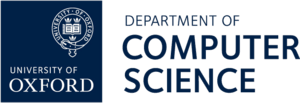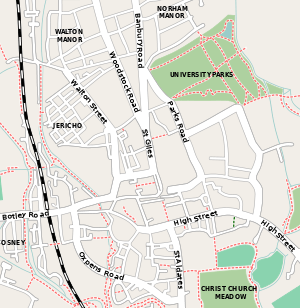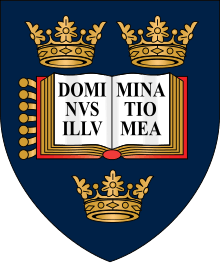Department of Computer Science, University of Oxford
 | |
Former names | Computing Laboratory |
|---|---|
| Established | 1957 |
Parent institution | University of Oxford |
| Head of Department | Michael Wooldridge |
Academic staff | 52 |
| Students | 871 |
| Undergraduates | 681 |
| Postgraduates | 50 |
| 140 | |
| Location | Oxford, United Kingdom |
| Website |
www |

The Department of Computer Science is the computer science department of the University of Oxford, England. It was founded in 1957 as the Computing Laboratory. By 2014 the staff count was 52 members of academic staff and over 80 research staff. The 2015 QS World University Subject Rankings places Oxford 3rd in the world [1] for Computer Science (after MIT & Stanford) and 1st in Europe with Cambridge in 7th. Oxford is also the top university for computer science in the UK and Europe according to Business Insider[2] and was ranked 2nd for Computer Science and Information Systems (after Cambridge) in the 2016 Guardian University league tables.[3]
Teaching
From its foundation the department taught undergraduates reading for mathematics and engineering degrees, but in 1985 the department's first undergraduate course was established, in 'Mathematics and Computation', followed in 1994 by the 'Computation' course.[4] Initially these two courses had a common first year.[5] 'Computer Science' replaced 'Computation' in the title of both courses for students starting their studies in 2000.[6] Between 1987 and 2006 students started studies on a four-year (undergraduate) MEng in Engineering and Computing Science.[4][7][8][9] In October 2012 the first students of the 'Computer Science and Philosophy' started. Today students on all three courses have the choice between a 3-year BA or a 4-year 'undergraduate masters'.[10] Sixty students began one of the three undergraduate courses in October 2013.[11]
There are two full-time taught postgraduate courses: the MSc in Computer Science (approx 50 students total) and the MSc in Mathematics and the Foundations of Computer Science (MFoCS) (approx 15 students total).
The department also offers the part-time Software Engineering Programme, a modular course for industry professionals, leading to either the MSc in Software Engineering (approx 240 students at present) or the M.Sc. in Software and Systems Security (approx 45 students at present).[12]
Research
The Department is home to around 145 academic and research staff.[12] The Department's doctoral programme has over 140 research students (studying for a D.Phil – the Oxford term for a PhD) working across a wide range of subjects in Computer Science and Software Engineering.
After fifty years within the department, the Numerical Analysis group moved in 2009 to be part of the university's Mathematical Institute.[13][14] Today the department's research is classified into eight broad themes:[15]
- Algorithms
- Automated Verification
- Computational Biology
- Foundations, Logic and Structures
- Information Systems
- Programming Languages
- Security
- Software Engineering
Senior Academic Staff: Professors
As of 2015 the department employs 36 Professors.[16]
- Samson Abramsky, Christopher Strachey Professor of Computing
- Michael Benedikt, Professor of Computing Science
- Richard Bird, Emeritus Professor
- Kevin Burrage, Professor in Computational Systems Biology
- Luca Cardelli, Royal Society Research Professor
- Bob Coecke, Professor of Quantum Foundations, Logics and Structures
- Sadie Creese, Professor of Cybersecurity
- Jim Davies, Professor of Software Engineering
- Nando de Freitas, Professor of Computer Science
- Oege de Moor,[17] Professor of Computer Science
- David Gavaghan, Professor of Computational Biology
- Jeremy Gibbons, Professor of Computing
- Leslie Ann Goldberg, Professor of Computer Science
- Paul Goldberg, Professor of Computer Science
- Georg Gottlob, Professor of Informatics
- Ralf Hinze,[18] Professor of Software Engineering
- Tony Hoare, Emeritus Professor
- Ian Horrocks, Professor of Computer Science
- Peter Jeavons, Professor of Computer Science
- Marina Jirotka, Professor of Human Centred Computing
- Elias Koutsoupias, Professor of Computer Science
- Daniel Kroening, Professor of Computer Science
- Marta Kwiatkowska, Professor of Computing Systems
- Gavin Lowe, Professor of Computer Science
- Thomas Lukasiewicz, Professor of Computer Science, Yahoo! Research Fellow
- Ursula Martin,[19] Professor of Computer Science
- Tom Melham, Professor of Computer Science
- Boris Motik,[20] Professor of Computer Science
- Luke Ong,[21] Professor of Computer Science, Director of Graduate Studies
- Joel Ouaknine,[22] Professor of Computer Science
- Stephen Pulman, Professor of Computational Linguistics
- Blanca Rodriguez, Professor of Computational Medicine, Wellcome Trust Senior Research Fellow in Basic Biomedical Sciences
- Bill Roscoe, Professor of Computing Science
- Michael Wooldridge,[23] Head of Department of Computer Science, Professor of Computer Science
- James Worrell,[24] Professor of Computer Science
- Hongseok Yang,[25] Professor of Computer Science
History
Starting in 1952, mathematician Charles Coulson[26] sought funding for Oxford to own its own computer.[4] At this time university members had to hire computer time from elsewhere.[4] In 1956 the University Grants Committee decided to fund the purchase of a Ferranti Mercury and the Oxford University Computing Laboratory was born[4] (shortened OUCL or Comlab). As well as facilitating research elsewhere in the university, the new department had its own academic function, performing research in numerical analysis, and lecturing for mathematics and engineering students.[27] The first director, Leslie Fox,[28][29] was appointed in 1957 and the following year the department moved into its first home, 9 South Parks Road.[27] In 1963 the department moved to 19 Parks Road.[30] The Computing Service (today part of IT Services) was administratively split from the academic department in 1969,[31] although complete independence was only gained in 1978.[32]
Complementing the Numerical Analysis Group, the Programming Research Group was set up in 1966 at 45 Banbury Road under the leadership of Christopher Strachey[33] with the aim "to bring some coherence into the present ad hoc nature of programming and software".[34] These two groups operated mostly separately until 1984 when both of the laboratory's research groups moved into 8–11 Keble Road, opposite Keble College.[13] However the laboratory soon outgrew this space, and occupied space in 2 South Parks Road,[35] until in 1993 the Wolfson Building opened behind the Victorian 8–11 Keble Road houses.[13] The neighbouring houses at 5–7 Keble Road and a new "e-Science building" behind these provided additional space upon opening in 2007.[36] However this space is not sufficient, and the department has additional space within the Thom Building and the Robert Hooke building. As of 2014, the department is hoping to obtain funding for a new building large enough to bring together all its activities.[37]
From 2003 to 2014 the department was led by Bill Roscoe, who oversaw the 2011 renaming from the Oxford University Computing Laboratory to the Department of Computer Science, University of Oxford.[13] The current head is Michael Wooldridge.[13]
See also
- Past and present members of the Department
- Oxford University Computing Services
- Programming Research Group
References
- ↑ http://www.topuniversities.com/subject-rankings
- ↑ http://www.peridotportal.co.uk/oxforddepartmentofcomputerscience/about.php
- ↑ http://www.theguardian.com/education/ng-interactive/2015/may/25/university-guide-2016-league-table-for-computer-science-information
- 1 2 3 4 5 http://www.oua.ox.ac.uk/holdings/Computing%20Laboratory2%20CL.pdf
- ↑ http://web.archive.org/web/19990423144719/http://www.comlab.ox.ac.uk/oucl/courses/ba-mandc.html
- ↑ http://www.ox.ac.uk/gazette/1998-9/weekly/130599/exam.htm
- ↑ http://web.archive.org/web/20080618073444/http://web2.comlab.ox.ac.uk/oucl/courses/undergrads/meng-ecs/
- ↑ http://www.ox.ac.uk/media/global/wwwoxacuk/localsites/gazette/documents/statisticalinformation/adstats06.pdf
- ↑ http://www.ox.ac.uk/media/global/wwwoxacuk/localsites/gazette/documents/statisticalinformation/2_vol138.pdf
- ↑ http://www.cs.ox.ac.uk/ugadmissions/how_to_apply/choose_course.html
- ↑ http://www.ox.ac.uk/about_the_university/facts_and_figures/undergraduate_admissions_statistics/courses.html
- 1 2 "Frequently asked questions". Department of Computer Science, University of Oxford, UK. Archived from the original on January 10, 2010. Retrieved July 4, 2011.
- 1 2 3 4 5 "About the Department of Computer Science". Department of Computer Science, University of Oxford, UK. Retrieved 22 April 2014.
- ↑ http://www.maths.ox.ac.uk/groups/numerical-analysis
- ↑ "Research Themes". Department of Computer Science, University of Oxford, UK. Retrieved June 15, 2011.
- ↑ "People in the Department of Computer Science". University of Oxford. Archived from the original on 2014-08-09.
- ↑ Oege de Moor at DBLP Bibliography Server
- ↑ Ralf Hinze's publications indexed by Google Scholar
- ↑ Ursula Martin's publications indexed by Google Scholar
- ↑ Boris Motik's publications indexed by Google Scholar
- ↑ Luke Ong's publications indexed by Google Scholar
- ↑ Joel Ouaknine's publications indexed by Google Scholar
- ↑ Michael Wooldridge's publications indexed by Google Scholar
- ↑ James Worrell's publications indexed by Google Scholar
- ↑ Hongseok Yang's publications indexed by Google Scholar
- ↑ Altmann, S. L.; Bowen, E. J. (1974). "Charles Alfred Coulson. 1910-1974". Biographical Memoirs of Fellows of the Royal Society. 20: 74. doi:10.1098/rsbm.1974.0004.
- 1 2 http://www.oucs.ox.ac.uk/internal/annrep/annrep57-58.html
- ↑ O'Connor, John J.; Robertson, Edmund F., "Department of Computer Science, University of Oxford", MacTutor History of Mathematics archive, University of St Andrews.
- ↑ Department of Computer Science, University of Oxford at the Mathematics Genealogy Project
- ↑ http://www.oucs.ox.ac.uk/internal/history/building-photos.xml
- ↑ http://www.oucs.ox.ac.uk/internal/annrep/annrep68-69.html
- ↑ http://www.oucs.ox.ac.uk/internal/annrep/annrep77-78.html
- ↑ Campbell-Kelly, Martin (1985). "Christopher Strachey, 1916-1975: A Biographical Note". IEEE Annals of the History of Computing. 7 (1): 19–42. doi:10.1109/MAHC.1985.10001. ISSN 1058-6180.
- ↑ http://www.oucs.ox.ac.uk/internal/annrep/annrep65-66.html
- ↑ http://web.archive.org/web/19990220045557/http://www.comlab.ox.ac.uk/oucl/structure.html
- ↑ http://www.rae.ac.uk/submissions/ra5a.aspx?id=23&type=uoa&subid=746
- ↑ http://www.peridotportal.co.uk/oxforddepartmentofcomputerscience/roles.php
Coordinates: 51°45′35″N 1°15′30″W / 51.7597°N 1.2584°W
